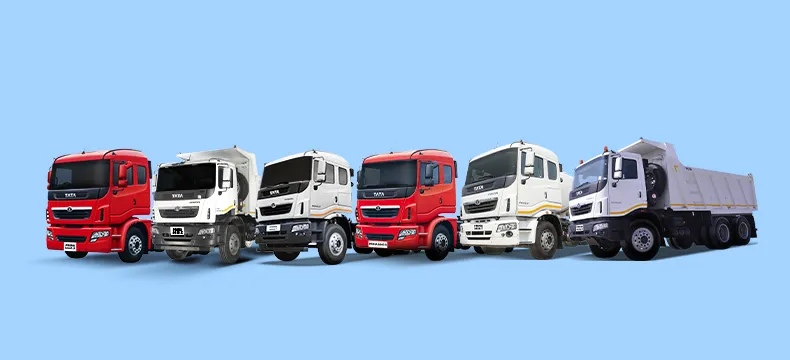12 Dec 2025

Difference Between Petrol and Diesel Engines - Key Details
- Tata Motors
- 2 Sep 2025
- COMMERCIAL VEHICLE
Introduction
Choosing between petrol vs diesel engines is no longer just about fuel preference. It’s a decision influenced by your driving habits, vehicle type, regional fuel prices and, increasingly, environmental regulations.
In the Middle East, where commercial and personal mobility needs are diverse, understanding the mechanics and applications of petrol and diesel engine types can help fleet operators and everyday drivers alike make more informed decisions.
Both petrol and diesel fuels originate from crude oil through fractional distillation, but their composition, ignition and application vary widely. The difference between petrol and diesel engines extends far beyond just the type of fuel. It defines how they operate, the kind of vehicles they power and their role in your business or lifestyle.
Petrol Engine
Petrol engines, commonly used in light-duty vehicles, rely on a spark ignition system. These petrol engine vehicles operate on the Otto cycle. This comprises two isochoric and two isentropic processes. A carburettor blends air and petrol before this mixture enters the combustion chamber, where an electric spark ignites after compression.
This configuration allows petrol engines to run smoothly and deliver high revs. This makes them ideal for smaller cars, motorcycles and high-performance vehicles. Their components are typically lighter, resulting in a more compact and responsive driving experience, which is well-suited for city use and quick acceleration.
Diesel Engine
Diesel engines are named after Rudolf Diesel and function quite differently. Rather than using a spark, these engines rely on compression ignition. Air alone is compressed in the chamber to high temperatures. When diesel is injected, it combusts instantly due to the heat created by compression.
Operating on the Diesel cycle, these engines generate more torque. As a result, diesel engine vehicles, such as trucks, buses, and agricultural machinery, benefit from superior pulling power and better fuel economy over long distances. While heavier and more costly upfront, these engines are designed for durability and load-bearing applications.
Key Differences Between Petrol and Diesel Engines
Beyond the fuel itself, these engines differ in design, function and environmental impact.
-
Refining Process
Although both fuels undergo fractional distillation, petrol is further enhanced by catalytic reforming to increase its octane rating. Diesel, on the other hand, may require hydrocracking but often doesn’t need further refining due to its naturally high density.
-
Quality Testing
Petrol is tested based on its octane rating. It is a measure of its resistance to knocking. Diesel relies on the cetane number, which indicates how readily the fuel ignites under compression. This impacts performance and efficiency in different conditions.
-
Ignition Process
Petrol engines use spark plugs for ignition, whereas diesel engines rely solely on heat generated through compression. This means that diesel engines do not require spark plugs, contributing to their longevity, but also to their more complex maintenance needs.
-
Engine Design and Performance
Diesel engines are more robust and offer greater torque. This makes them suitable for towing and transporting heavy loads. Conversely, petrol engines offer higher RPMs and faster throttle response, delivering a more agile driving feel. When it comes to fuel, diesel engines are roughly 20–30% more efficient than their petrol counterparts. This is a significant factor for long-distance operators.
-
Environmental Impact
Petrol engine vehicles emit more CO2 due to higher fuel consumption, contributing to greenhouse gas emissions. Diesel, though more fuel-efficient, produces higher levels of NOx and particulate matter. Moreover, diesel engines tend to be noisier due to higher compression ratios.
-
Fuel Prices
In many parts of the Middle East, diesel is subsidised for commercial use, making it more economical in the long run despite high upfront costs. Petrol is usually cheaper per litre but requires more frequent refuelling, especially under heavy usage.
Choosing Between Petrol and Diesel
Here is how you can decide between petrol and diesel:
-
Driving Conditions
If your routes are mainly urban with frequent stops and short trips, a petrol engine might serve you better. However, if you spend long hours on highways or operate heavy-duty vehicles, diesel efficiency becomes a clear advantage.
-
Government Regulations and Incentives
Many Middle Eastern countries are introducing stricter emissions standards. Some offer incentives for using cleaner diesel technologies, while others penalise high-emission vehicles. These policies can tip the scale in favour of one fuel over the other.
-
Type of Vehicle and Lifestyle
Commercial fleets, construction vehicles and long-haul transporters benefit from diesel’s durability and torque. Meanwhile, personal cars and city-focused transport favour petrol’s lighter build and lower emissions in short bursts. Align your choice with how and where the vehicle will be used.
When to Choose Petrol?
Opt for petrol if you:
- Drive light vehicles or passenger cars.
- Want quicker acceleration and smoother handling.
- Have a lower upfront budget.
- Drive mostly within cities or short-range routes.
Petrol engines also tend to be quieter and require less initial maintenance, making them popular for private ownership.
When to Choose Diesel?
Diesel is your best bet if you:
- Operate commercial or heavy vehicles.
- Cover long distances regularly.
- Need strong torque for towing or load-carrying.
- Want better fuel economy over time.
Diesel engine vehicles are built to last, making them a long-term investment for businesses and transport operations alike.
Petrol Vs. Diesel: Making The Right Choice
There is no universal winner in the petrol vs. diesel engine comparison. It all depends on your needs. Evaluate your usage, location, government guidelines, and environmental impact before making a choice. Always refer to the manufacturer’s guidance and avoid switching fuels based solely on cost, as the implications extend beyond your wallet.
Seeking the perfect vehicle for your business or lifestyle? Tata Motors offers a robust portfolio of petrol and diesel engine vehicles designed to meet diverse needs across the Middle East.
FAQs
Which engine lasts longer: petrol or diesel?
Diesel engines generally last longer due to their robust construction and lower engine revolutions per minute (RPMs).
Do diesel engines require more maintenance?
Diesel engines can be more expensive to maintain due to the complexity of components such as turbochargers and fuel injectors.
Which engine is more suitable for long-distance travel?
Diesel is typically more efficient and suitable for long-hauls due to its torque and fuel economy.
How does fuel pricing impact the choice between petrol and diesel trucks?
While diesel trucks initially cost more, fuel savings and subsidies in some regions may offset this over time, especially for high-mileage users.
- Tags





















